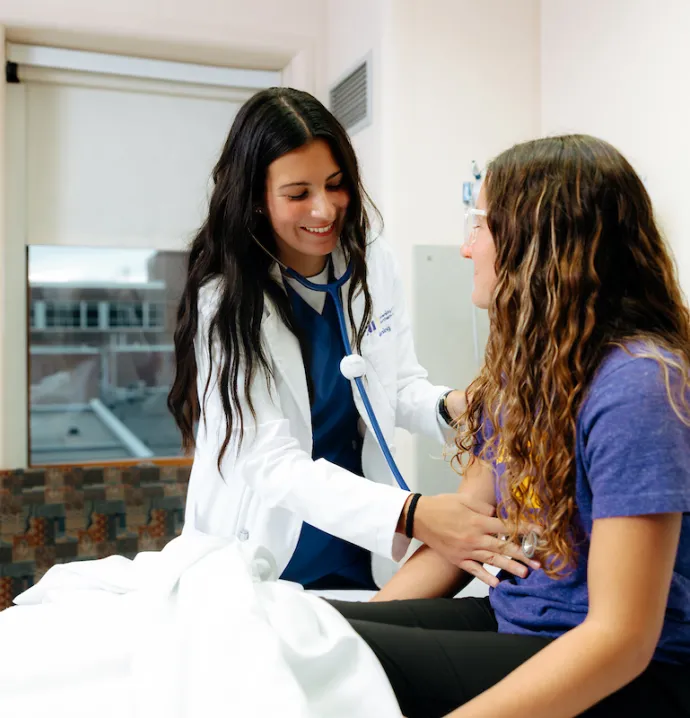5 questions on the COVID-19 vaccine
5 questions on the COVID-19 vaccine
With more than 115 million Americans now fully vaccinated against COVID-19, the focus has shifted to people who are hesitant or undecided. We talked to UNI biology professor Dave McClenahan, an immunologist who studies infectious disease, about why nearly everyone should be fully vaccinated.
Why should people with healthy immune systems get vaccinated?
There’s three reasons - one your immune response will vary depending on the infectious agent. Maybe you can handle the cold or influenza but COVID is a different organism. There’s no way of predicting this without actually “testing” the hard way.
Two, many individuals become infected with no or minimal clinical signs - these are the asymptomatic people who can unknowingly spread the infection to others. Finally even if you develop clinical signs later, there is the incubation period before that occurs in which you can unknowingly spread the virus.
So yes you may not develop clinical signs. That’s great for you, but not necessarily the people you’re in contact with.
Do people really need a second dose of Pfizer-BioNTech vaccine? What if they had a strong reaction to their first dose?
I would definitely encourage getting the second shot - you’re going to get the best protection that way. That response you may get is actually your innate immune system reacting to protect you. If you get both shots, you're unique, you're in the mid-90s percentile of being protected. It’s a good gain and worth getting the shot.
The theory too is that the second shot gives you more long-term protection. Have we tested this yet? No. But if we look at past experience with other vaccines the answer would easily be yes, you know, booster a lot of vaccines, and the idea is, is that, that gives you a longer sustained higher level of immunity. So, unless this is totally different, I think it's a pretty safe assumption, that this should give us longer lasting immunity. The question is, how long is that longer lasting immunity?
Over one-third of the U.S. has been vaccinated already. Why does it matter if I get vaccinated?
That's easier to answer, actually. You know, we talked about herd immunity, and again some of this is theoretical, but the numbers are estimated to be between 60 to 68%. And the idea with herd immunity is once you get that number of the population exposed, either exposed to the virus itself or to the vaccine, that the virus will not have a suitable number of hosts to maintain itself. That is what we want.
If we hit that number, eventually, this potentially could disappear, though, I'm guessing they'll always be pockets. There's still going to be children and others that are not going to be vaccinated, there's still going to be individuals who are immuno-compromised and can't be vaccinated. So I think it's critical if we're gonna hit herd immunity that we need to get as many people on board that can be vaccinated, vaccinated.
There's been some news that the U.S. may not reach herd immunity through vaccination this year. Is that the only way to beat the pandemic?
The answer is no. If we wanted to go back and repeat last year and socially distance and wear masks all the time, we don’t have to hit herd immunity. But the idea is, if we get enough people vaccinated hopefully we can cease and desist doing all the social distancing and wearing a mask. What is the simpler, preferable way? I would argue that vaccinations are a much simpler solution to hopefully getting back to a more normal lifestyle.
There’s a couple of different models now that are predicting by July we’re going to be down quite a bit in terms of cases. And my concern is, if we don't get more people vaccinated, we're going to be dealing with those little flash fires for who knows how long. And another thing is we've demonstrated with other viruses that the longer this virus is out there, and the more it's out there, the more chance it has for mutations and potentially changing enough where our current vaccines will not be protective anymore. And that’s not a good thing.
Should parents be comfortable having their teenaged children vaccinated?
Yes. In terms of safety, there really shouldn't be any difference. By the time you’re 5 or 6 years old, your immune response that you’ll have for the rest of your life is fairly developed. Younger individuals are more likely to have asymptomatic infections, much more so than an older individual. So again, if we're trying to eliminate this virus, if we have a whole large population of children that are infected and don't realize it, that’s not good. They're coming into contact with older individuals like grandparents and people who might have pre-existing conditions that are gonna make them more likely to develop disease with COVID.




